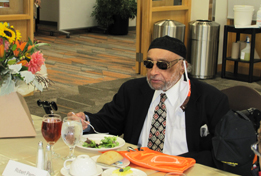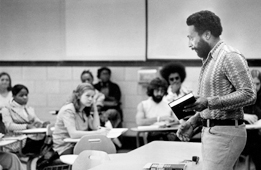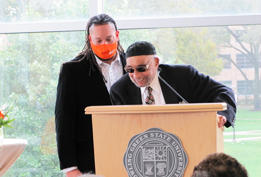 By Fletcher Word
By Fletcher Word
Sojourner’s Truth Editor
Family, friends, former colleagues of Robert L. Perry, PhD, joined the staff, faculty and administration of Bowling Green State University on Thursday, June 23, to unveil the Robert L. Perry Veranda which will be located at the campus’s Shatzel Hall.
During a ceremony in which BGSU’s Chief Diversity and Belonging Officer Jennifer McCary served as mistress of ceremonies, several current university officials praised Perry for his contributions to the institution especially in founding and leading the Ethnic Studies program in 1970.
“The work of belonging and diversity can be traced back more than 50 years ago to Dr. Perry,” said University President Rodney Rogers during his remarks as he called Perry “a trailblazer in the discipline and in our community. “
He added: “To know where we are heading as a university, we have to recognize and understand where we have been. Dr. Perry’s work is one of those mileposts of progress in our history.”
Perry’s association with BGSU runs deep. He is a two-time alumnus of BGSU, earning a bachelor’s degree in 1959 and a masters in 1965.
Then came the seismic changes of 1970.
“In 1970, a committee was approved,” said Provost and Sr. Vice President for Academic and Student Affairs Angela Nelson, PhD, as she traced the development and the timeline of the Ethnic Studies program that Perry founded and led.
 The department, she noted, made “BGSU one of the first in the Midwest” to develop such a course of studies.
The department, she noted, made “BGSU one of the first in the Midwest” to develop such a course of studies.
By 1979, Ethnic Studies was granted departmental status which “provided a strong academic background for advancing the discipline,” said Nelson, “which helped to make Bowling Green a better place to learn.”
In 1992, under Perry’s guidance, BGSU established a cultural diversity course requirement for all students. It was the first such required course in the nation.
Perry, now a distinguished Professor Emeritus in the Department of Ethnic Studies, retired in 1997 after chairing the department for nearly two decades.
Present at the ceremony, along with Perry’s two sons, daughter and two grandchildren, was John Scott, PhD, former professor, who chaired the committee which selected Perry to lead the program.
Perry took the podium to express his thanks not only for the honor that was bestowed upon him but also for the university’s enduring “commitment to ensuring the continuity of ethnic studies.”
 Acknowledging the “ongoing attacks” on the struggle for equity and inclusion in the country today, Perry said: “it is very inspiring to witness some zeal for inclusiveness among the statements today.”
Acknowledging the “ongoing attacks” on the struggle for equity and inclusion in the country today, Perry said: “it is very inspiring to witness some zeal for inclusiveness among the statements today.”
Indeed, he said, “racism is alive and well today, the attacks on local school boards nationwide over critical race theory demonstrate how important ethnic studies is today.”
Perry also expressed his thanks for those who worked with him to start the program at BGSU.
“We did it together,” he recalled. “We began by listening to the students’ experiences.”
Highly publicized events such as the Orangeburg (three protesters shot and killed in 1968 on the South Carolina State University campus) and the Kent State (four protesters shot and killed) massacres paved the way for the BGSU program.
“That era birthed ethnic studies at Bowling Green State University,” said Perry. “And we were fortunate to have faculty dedicated to their craft.”
Perry also reminisced about the contribution of author James Baldwin to the program. Baldwin, the first hire, would return four times to the campus, said Perry, and wrote much of his last novel, Just Above My Head, at the university.
“Bowling Green is a very special place for me and my family,” said Perry, closing his acceptance remarks. “I look forward to help create even more growth and to reach higher heights.”





